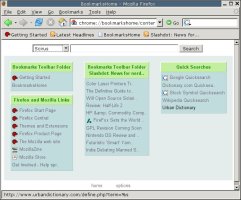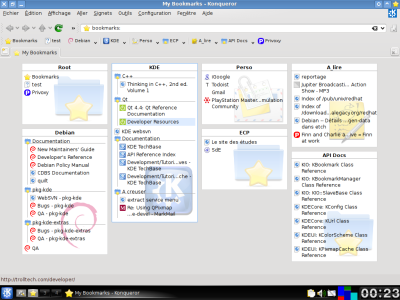 |  |
The new Opera "speed dial" feature (above left) reminded me of the "bookmarks home" Firefox extension (above right). This extension displays the user's bookmarks in a HTML page, allowing direct one-click access to them. Used as start page, it's a great way of accessing one's bookmarks rapidly.
I have used KDE since 1.1, and love the way KDE 4 is getting into shape. I took advantage of this new release to explore the underlying mechanisms and libraries, not as a user but as a developer, asking myself what I could do for KDE. Then, I decided to work on Konqueror's bookmarks handling. My first move is kio_bookmarks, which displays user bookmarks as a HTML page.
 |
KIO slaves are a great technology: the kio_bookmarks process serves HTML and PNG content to Konqueror as a PHP script would do, and takes advantage of the KDE libraries and services. I think they are a good place to start digging into KDE, as long as one is aware of its restrictions. The one which drove me mad is that slaves can't receive D-Bus signals (bookmark changes, configuration updates, etc), so kio_bookmarks has to reparse everything each time the page is updated.
kio_bookmarks is available for KDE 4.1 on kde-apps and I hope to get it integrated in KDE 4.2. Ongoing features are a configuration dialog, web search form, and maybe other data sources ("places", and web history if technically possible). I also have plans for a Plasma applet and bookmarks editor improvements.
The great features to come in future KDE revisions seem to be Akonadi (a database-driven storage for PIM applications) and NEPOMUK (the "semantic desktop"). I think there's a way here to innovate in bookmarks handling (synchronization with online sources, tagging, scoring, and so on) and I hope to be part of it. One would say users hate to change habits (Epiphany got a lot of haters for its bookmarks tagging system), but isn't KDE4 about innovation?
 KDE Commit-Digest
KDE Commit-Digest